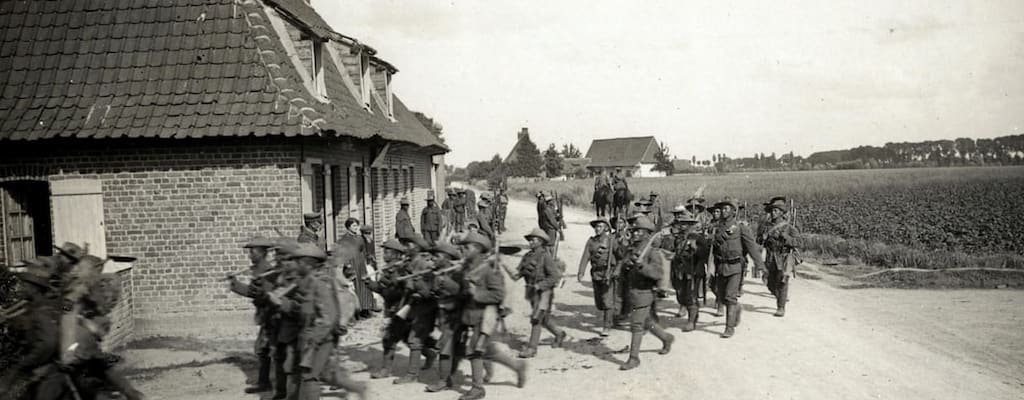beats one’s swords into plowshares: Idiom Meaning and Origin
What does ‘beats one's swords into plowshares’ mean?
The idiom "beats one's swords into plowshares" means to turn from military aggression to peaceful activities or pursuits.

Idiom Explorer
The idiom "sheathe the sword" means to withdraw from a conflict or to end hostilities. It derives from the act of putting a sword back into its sheath, symbolizing the cessation of aggression or violence.
The idiom "dust off a batter" means to defeat someone easily, especially in a sports or competitive context.
The idiom "cut both ways" means that a situation or action can have both positive and negative consequences. It implies that something can have a double-edged effect or outcome.
The idiom "cross swords" means to have a conflict or engage in a fierce argument or disagreement with someone.
The idiom "come to blows" means to engage in a physical fight or altercation.
The idiom "come out swinging" means to begin a competition or argument with great force or determination. It is often used to describe someone who starts a fight or confrontation aggressively and forcefully.
The idiom "choose violence" means to deliberately opt for an aggressive or confrontational approach to a situation, often as a means of resolving conflicts or getting one's way.
The idiom "change one's tune" means to change one's opinion or attitude, especially in a more agreeable or accommodating way.
The idiom "catch hands" means engaging in physical combat or getting involved in a fight.
The idiom "butter one's bread on both sides" means to take advantage of a situation or opportunity to benefit oneself in multiple ways rather than just one.
Warrior's Tools Become Tools
The idiom "beats one's swords into plowshares" has its roots in the Bible, specifically in the book of Isaiah in the Old Testament. The phrase can be found in Isaiah 2:4, where it states that nations will beat their swords into plowshares and their spears into pruning hooks, signifying a shift from aggression to peace.
This expression is often used to convey the idea of repurposing or transforming something that was originally intended for harm or destruction into something beneficial or productive. It's a symbolism of the transition from conflict to harmony, highlighting the importance of finding peaceful solutions instead of resorting to violence.
Throughout history, the concept of turning weapons into tools for agriculture can be traced back to ancient times. In various cultures and civilizations, conquering armies would often melt down the weapons of their defeated enemies to create utensils or farming implements. This practice served as a display of power, but also as a practical way to make use of available resources.
The idiom "beat one's swords into plowshares" has become a widely recognized metaphorical expression, representing the desire for peace and the rejection of violence. It is commonly used in discussions about disarmament, pacifism, and the pursuit of peaceful resolutions to conflicts. By promoting cooperation and societal improvement instead of aggression and warfare, it highlights the importance of prioritizing peace over conflict.
It is important to note that this idiom has variations in different English-speaking regions. In some places, it may be referred to as "beat one's swords into ploughshares," with "ploughshares" being the British English spelling of "plowshares." Both versions of the idiom convey the same meaning and are used interchangeably.
Another related idiom is "sheathe the sword," which also emphasizes the idea of laying down weapons and choosing peace instead of violence. It is often used to describe the act of de-escalating a conflict or choosing not to engage in aggression. While it has a slightly different phrasing, the underlying message is similar to that of "beats one's swords into plowshares." These idioms all advocate for the importance of peaceful resolutions and the rejection of violence.
The idiom "beats one's swords into plowshares" originated from the Bible and has evolved to represent the desire for peace and the rejection of violence. It symbolizes the transformation of something harmful into something beneficial, highlighting the need for peaceful resolutions to conflicts. The variation "beat one's swords into ploughshares" is also used in certain English-speaking regions, and another related idiom is "sheathe the sword." These idioms all promote the importance of peace and cooperation in creating a harmonious world.
Example usage
Examples of how the idiom *beats one's swords into plowshares* can be used in a sentence:
1. After years of warfare, the country decided to beat their swords into plowshares and focus on agriculture and peaceful development.
2. The government allocated a large budget to education, which is a great example of beating swords into plowshares and investing in the future.
3. The CEO of the company transformed their aggressive marketing strategy into a more social responsibility approach, demonstrating the concept of beating swords into plowshares.
More "Conversion" idioms
We missed the mark - nothing found.



